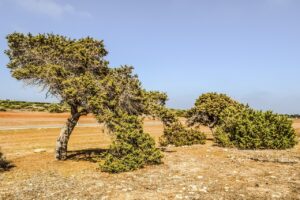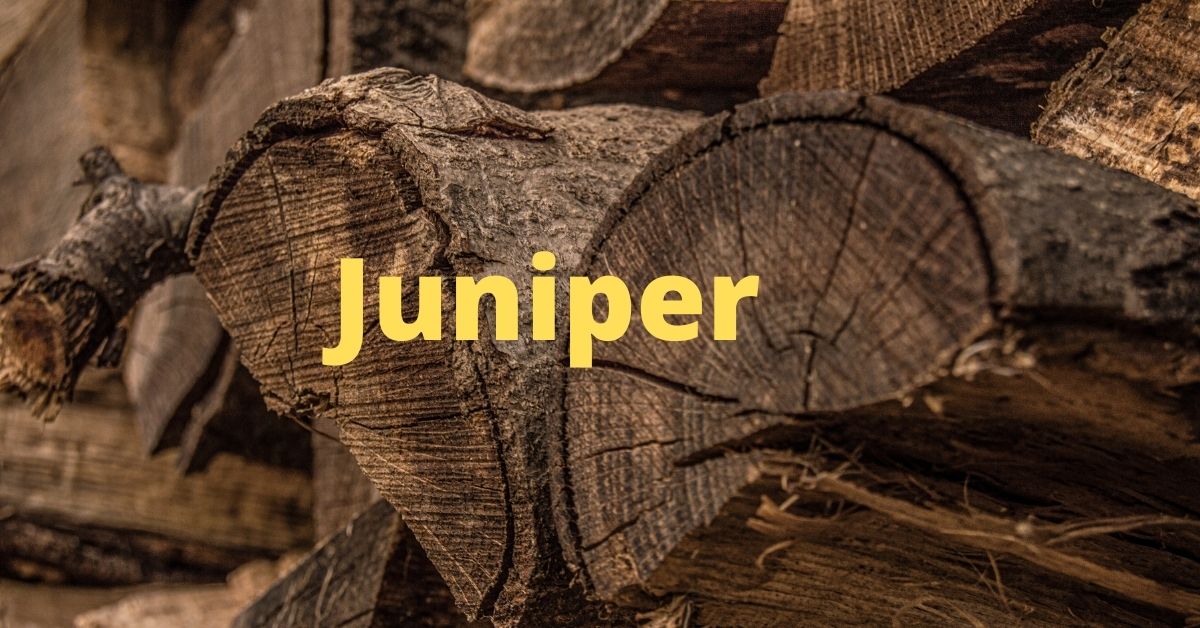Juniper is an aromatic green tree or shrub depending on its type. Its genus is Juniperus and the genus contains about 60 to 70 different species. this plant produces berry-like cones which are used for flavoring foods and alcoholic beverages.
These berries have a spicy fragrance aroma and a slight bitter-sweet flavor. Oil of juniper is used in medicines(diuretics) and in perfumes.

Contents
Is Juniper Good Firewood
Juniper is used for making fires for cooking and burning purposes. Juniper wood is a type of softwood that produces more heat as compared to other softwoods but in comparison with heat produced by hardwood, its heat is less.
Overall a cord of Juniper wood produces 21.8 million BTU but this value may vary depending upon the species of the juniper used for the burning.
The three most common types used as firewood are Rocky Mountain Juniper, Shaggy Juniper, and Western Juniper.
Its wood is quick-burning but a person has to restock the fireplace more often than if hardwood is used. Also, coals produced by juniper firewood will not last long.
So in order to improve the BTUs of juniper wood, a small amount of hardwood should be mixed with it. This will result in a longer time of wood-burning and more heat production.
Seasoning Time Of Juniper Firewood
The low moisture content of rocky mountain juniper results in short seasoning time. The internal moisture content of this wood will be 45 percent at the time of cutting.
The ideal moisture content for this wood is 20 percent and this lower percentage of moisture is achieved through proper seasoning of the wood.
A six-month seasoning time is required by this wood except for western juniper wood, which requires seasoning for at least one year.
Seasoned logs should be prevented from exposure to rain and snow, hence should be stored indoors.
A seasoning time of more than one year would not be recommended for this wood.
To give room for air circulation around the cut edges, wood should be stacked off the ground. A space of two to three feet would be enough for air circulation.
Properly seasoned juniper wood will have no bark attached to it. Its color would be tan or grey. It will feel light and when it is tapped by another piece of wood, it will make a hollow sound.
While purchasing juniper firewood from the timber market, always opt for the naturally seasoned firewood. Because naturally seasoned wood will be sustainable one than the kiln seasoned wood, which produces more emission than the natural process.
Resin /SAP Content
Despite having a high resin content, this wood is easy to ignite. Because of the resin content, it produces snapping and popping sounds which feel pleasant to the ears.
But resin content can also result in sparks and coal escaping. So a protective screen should be used in order to avoid an incident.
Although high resin content leads to difficulty in splitting the wood this is not the case for juniper wood. It does not matter if would is fresh or dried, it will be very easy to split it in both conditions.
Smell
The fragrant smoke produced by its wood is a natural insect repellent. So it is great for campfires. As the cedar tree is closely related to the juniper tree, they both have similar very fragrant scents. Both create a rich, spicy and earthy scent.
Smoke
While it smells amazing, juniper wood will produce smoke. This production of smoke depends on wood moisture content.
So, if the juniper wood will be properly seasoned, its smoke production will be very low. This wood burns at a low temperature which results in the residual unburned organic compounds which can clog up your chimney.
If it is mixed with any hardwood, the burning temperature will increase, resulting in less production of
unburned organic compounds or creosote.
HOW EXPENSIVE IS JUNIPER FIREWOOD?
Juniper wood is not a great option from an economic perspective. Depending on the location, it can be slightly higher in price as compared to a cord of oak wood.
Also, as it burns very quickly and produces less heat, a person would require more firewood of juniper as compared to firewood of hardwoods.
It can become cost-effective if a person purchases unseasoned wood and season it by themselves. This is a great option if you have a protected outdoor area to store the unseasoned juniper wood.
These trees grow quickly. In a minimum of seven years, a juniper tree will be ready to harvest. So, it becomes an easily renewable resource for firewood.
Because many hardwood trees take decades to mature, which makes harvesting of those trees difficult and a long-term process.

